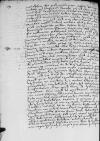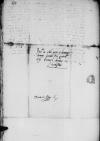Quae sint acta hic in causa Pucensi, partim ex superinscribed in place of crossed-out per⌈perexex superinscribed in place of crossed-out per⌉ domino written over um⌈umoo written over um⌉ ⌊castellano written over u⌈uoo written over u⌉m Elbingensi⌋, partim ex Ludovico Reverendissima Dominatio Vestra procul dubio iam cognovit. Cum scribenda esset expeditio, volebant et hic illi regnum suum exercere, sed eis non successit. Produxerunt exemplum, quo scribi volebant absolutionem suam, quod mitto Reverendissimae Dominationi Vestrae. Sed eorum imperio paritum non est, quamquam factus erat mitior ⌊Constellatus⌋, ad me venit semel atque iterum, me civitatis rationibus gravi cum expostulatione maximo esse impedimento querebatur. Cui ego fide, quam debeo principi ... illegible⌈...... illegible⌉ meo, me excusavi. Cumque iterum ad me venisset, ut secum pranderem, tanto studio petiit, ut ei negare non possem. Displicebant eis multa, quae a me scripta fuerant: „Spectabiles” volebant vocari, non „Famati”. Quem ego titulum eis favissem, nisi veritus essem, ne rebus in ⌊Puczko⌋ praeclare gestis se eum assecutum esse gloriarentur. Quod „supplices petierint, ut ne cum eis in iudicium intraret ⌊maiestas regia⌋”, id scribi omnino nolebant, maxime vero eos offendit verbum „supplices”. Quod aboleri cum cuperent, non obtinuerunt. Sed ne sibi negari omnia quererentur, pro „misericordiam” paulo post substitui „clementiam”. Et quoniam nihil agi videbam nisi eorum arbitrio, tribui illis „fidem”, tribui „constantiam”, tribui „merita”, ut vel hac ratione obtinere possem, ut quae scripta fuerunt a me ⌊reverendissimi domini⌋ mei iussu, ita ut scripta erant relinquerentur.
Cum vero aliae litterae scriberentur de negotio Pucensi, ibi vero maior fuit difficultas, nam neque decretum esse volebant, neque concordiam. Commissariorum fieri mentionem ullam vetabant et, revera, cum pronuntiaretur decretum, non erat facta. Illud cupiebant, ut eorum processus condemnatus tacite videretur. Et iam necesse habueram ex eorum imperio scribere, et scripseram. Cum a ⌊reverendissimo domino⌋ petii, ut ageret cum s
(erenissima) or (acra)⌈(erenissima)(erenissima) or (acra)⌉
⌊maiestate regia⌋, quo commissariorum quoque ratio haberetur. Egit diligenter. Iussit ⌊regia maiestas⌋ utrunque scribi ac scriptum ad se in rus, quo animi causa profectus  BCz 1618, p. 570 erat, adferri. Feci, quod iussus eram, attuli utrumque. Lectum est frequenti senatu, qui ad idem rus a reverendissimo ⌊domino archiepiscopo⌋ fuerat invitatus. Placuit omnibus, cum primis autem ⌊regiae maiestati⌋ id, in quo hidden by binding⌈[o]o hidden by binding⌉ facta fuit commissariorum mentio. Verbum unum mutatum non est. Sed non item placuit citatis, quibus nihil potuit accidere molestius, quam quod „ne unguem quidem latum discessisse”, recte decrevisse commissarios scripseram. Ad suam hoc infamiam pertinere putabant, quod esset commissariorum famae consultum. Iam illud aures eorum ferre non poterant, quod ista quinque milia in auro et duo milia in moneta hidden by binding⌈[eta]eta hidden by binding⌉ non tam ex debito, quam ex liberalitate sua regia numeranda illis decernerentur. Volebant hidden by binding⌈[t]t hidden by binding⌉ enim videri iudicio regem suum superasse, cum tamen iudicium nullum fuerit, sed ex imperio hidden by binding⌈[io]io hidden by binding⌉ eorum acta sint omnia. Porro quod scripseram: „assentientibus nuntiis”, id ipsi mutari postulabant hidden by binding⌈[nt]nt hidden by binding⌉: „de plenitudine potestatis nostrae regiae”; quo animo, in opinione Reverendissimae Dominationis Vestrae relinquere, quam hidden by binding⌈[m]m hidden by binding⌉ in epistula mea ponere malo. Cogitabant ipso die hidden by binding⌈[ie]ie hidden by binding⌉ divi Stanislai omnino discedere, idque prima luce. Sed eos reverendissimus ⌊dominus archiepiscopus⌋ prohibuit hidden by binding⌈[it]it hidden by binding⌉, apud quem urgebat expeditionem a secundis vesperis ac nondum esse coeptas litteras scribi querebatur ⌊Constellatus⌋, atque ut interponeret auctoritatem suam apud ⌊reverendissimum dominum Plocensem⌋, rogabant. Qui misit, ut expedirentur. Scriptae iam erant litterae, sed eorum tamen importunitati hidden by binding⌈[i]i hidden by binding⌉ datae non sunt. Cupiebant postea convenire ⌊reverendissimum dominum⌋ et ei valedicere. Rogavit ⌊is⌋, quoniam et advesperascebat et, cum ex capite laboraret, quieti hidden by binding⌈[i]i hidden by binding⌉ se tradere volebat, ut in crastinum differrent. Sed impetrare non potuit; veniebant importune, ad secundam noctis horam ⌊reverendissimum dominum⌋ detinebant, expediri postulabant. Sed a quo erant expediendi hidden by binding⌈[i]i hidden by binding⌉, is se data opera subduxerat, ita ut coacti sint absque expeditione discedere, relicto famulo, qui litteras acciperet. Postridie prima luce discesserunt hidden by binding⌈[t]t hidden by binding⌉, cum neque ipsi per se, neque per alium quemquam
BCz 1618, p. 570 erat, adferri. Feci, quod iussus eram, attuli utrumque. Lectum est frequenti senatu, qui ad idem rus a reverendissimo ⌊domino archiepiscopo⌋ fuerat invitatus. Placuit omnibus, cum primis autem ⌊regiae maiestati⌋ id, in quo hidden by binding⌈[o]o hidden by binding⌉ facta fuit commissariorum mentio. Verbum unum mutatum non est. Sed non item placuit citatis, quibus nihil potuit accidere molestius, quam quod „ne unguem quidem latum discessisse”, recte decrevisse commissarios scripseram. Ad suam hoc infamiam pertinere putabant, quod esset commissariorum famae consultum. Iam illud aures eorum ferre non poterant, quod ista quinque milia in auro et duo milia in moneta hidden by binding⌈[eta]eta hidden by binding⌉ non tam ex debito, quam ex liberalitate sua regia numeranda illis decernerentur. Volebant hidden by binding⌈[t]t hidden by binding⌉ enim videri iudicio regem suum superasse, cum tamen iudicium nullum fuerit, sed ex imperio hidden by binding⌈[io]io hidden by binding⌉ eorum acta sint omnia. Porro quod scripseram: „assentientibus nuntiis”, id ipsi mutari postulabant hidden by binding⌈[nt]nt hidden by binding⌉: „de plenitudine potestatis nostrae regiae”; quo animo, in opinione Reverendissimae Dominationis Vestrae relinquere, quam hidden by binding⌈[m]m hidden by binding⌉ in epistula mea ponere malo. Cogitabant ipso die hidden by binding⌈[ie]ie hidden by binding⌉ divi Stanislai omnino discedere, idque prima luce. Sed eos reverendissimus ⌊dominus archiepiscopus⌋ prohibuit hidden by binding⌈[it]it hidden by binding⌉, apud quem urgebat expeditionem a secundis vesperis ac nondum esse coeptas litteras scribi querebatur ⌊Constellatus⌋, atque ut interponeret auctoritatem suam apud ⌊reverendissimum dominum Plocensem⌋, rogabant. Qui misit, ut expedirentur. Scriptae iam erant litterae, sed eorum tamen importunitati hidden by binding⌈[i]i hidden by binding⌉ datae non sunt. Cupiebant postea convenire ⌊reverendissimum dominum⌋ et ei valedicere. Rogavit ⌊is⌋, quoniam et advesperascebat et, cum ex capite laboraret, quieti hidden by binding⌈[i]i hidden by binding⌉ se tradere volebat, ut in crastinum differrent. Sed impetrare non potuit; veniebant importune, ad secundam noctis horam ⌊reverendissimum dominum⌋ detinebant, expediri postulabant. Sed a quo erant expediendi hidden by binding⌈[i]i hidden by binding⌉, is se data opera subduxerat, ita ut coacti sint absque expeditione discedere, relicto famulo, qui litteras acciperet. Postridie prima luce discesserunt hidden by binding⌈[t]t hidden by binding⌉, cum neque ipsi per se, neque per alium quemquam  BCz 1618, p. 571 mihi valedixissent. Litterae sunt datae famulo, quem abeuntes reliquerant, quarum exempla mittet Reverendissimae Dominationi Vestrae dominus ⌊castellanus Elbingensis⌋. Spero ut in rebus ex imperio citatorum actis, fore ut non prorsus displiceant.
BCz 1618, p. 571 mihi valedixissent. Litterae sunt datae famulo, quem abeuntes reliquerant, quarum exempla mittet Reverendissimae Dominationi Vestrae dominus ⌊castellanus Elbingensis⌋. Spero ut in rebus ex imperio citatorum actis, fore ut non prorsus displiceant.
De burggrabiatu, ut audio, constans est ⌊reginalis maiestas⌋, sed cum ea pugnat ⌊primas⌋. Uter vincet, nescio. De palatinatu nihil adhuc. Visum est per biduum detinere ⌊Mauricium⌋, ut certi tamen aliquid afferat. ⌊Domino Elbingensi⌋ nihil est maiori impedimento, quam quod thesaurarius est.
⌊Nepos⌋ Vestrae Reverendissimae Dominationis venit, quem pro suo erga illam amore non gravatim ⌊reverendissimus dominus⌋ suscepit. Habitabit apud me ac quicquid erit, in quo mea opera usui ⌊illi⌋ esse queat, pro meo perpetuo erga Reverendissimam Dominationem Vestram studio et observantia, defutura illi non est. Cum domino ⌊Mischkowski⌋ nondum egi, agam hodie in capitulo. Cetera per ⌊Mauricium⌋.
Deum precor, ut Reverendissimam Dominationem Vestram quam diutissime servet incolumem et felicem. Cuius me gratiae commendo.
 BCz 1618, p. 570 erat, adferri. Feci, quod iussus eram, attuli utrumque. Lectum est frequenti senatu, qui ad idem rus a reverendissimo
BCz 1618, p. 570 erat, adferri. Feci, quod iussus eram, attuli utrumque. Lectum est frequenti senatu, qui ad idem rus a reverendissimo  BCz 1618, p. 571 mihi valedixissent. Litterae sunt datae famulo, quem abeuntes reliquerant, quarum exempla mittet Reverendissimae Dominationi Vestrae dominus
BCz 1618, p. 571 mihi valedixissent. Litterae sunt datae famulo, quem abeuntes reliquerant, quarum exempla mittet Reverendissimae Dominationi Vestrae dominus 


